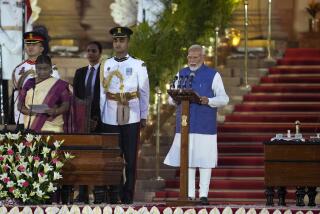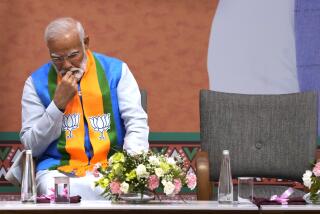Wanted: Indian Miracle Worker
For a democracy, inauguration day is usually a time of renewed faith. But in India, the fall of three governments in 20 months, combined with religious and sectional violence, has tempered hopes.
Prime Minister P. V. Narasimha Rao, 70, took office recently after the most traumatic parliamentary elections in India’s history. Former Prime Minister Rajiv Gandhi, the leader of the largest political party, Congress-I, was only one of more than 300 people killed.
Rao, who was unanimously chosen by Congress-I to be India’s ninth prime minister, inherits a destabilized parliamentary system, as well as age-old religious conflicts, caste tensions and explosive separatist movements.
Rao’s health is a worry. And his job is made more difficult by the lack of a clear voter mandate. The recent election drew only 53% of India’s eligible voters, the lowest turnout since independence. Although Congress-I emerged from the elections as the largest single party, it fell nearly 15 seats short of a controlling majority.
Rao has already appointed an experienced team of ministers, including his chief political rival, Sharad Pawar, and liberal Finance Minister Manmohan Singh. He will need to draw on his Cabinet as well as his own considerable experience to deal with all the problems.
The most urgent priority is to drastically liberalize, in the face of hostility from the entrenched bureaucracy, a struggling centralized economy that is plagued by declining growth, creeping inflation and a $70-billion foreign debt.
Rao and his party face other obstacles too. For instance, the fundamentalist Hindu Bharatiya Janata Party (BJP), India’s largest opposition party, is poised to take advantage of any misstep by Congress-I. The BJP has frequently exploited religious and caste divisions that contribute to instability.
Rao, a pragmatist and a consensus builder recognized for his unswerving party loyalty, could haul India back from the abyss. Much of India’s immediate future hinges on Rao’s ability to bring together--and keep together--other centrist parties. And on Indians’ ability to endure the kind of grave sacrifices for which they are so famous.
More to Read
Sign up for Essential California
The most important California stories and recommendations in your inbox every morning.
You may occasionally receive promotional content from the Los Angeles Times.










